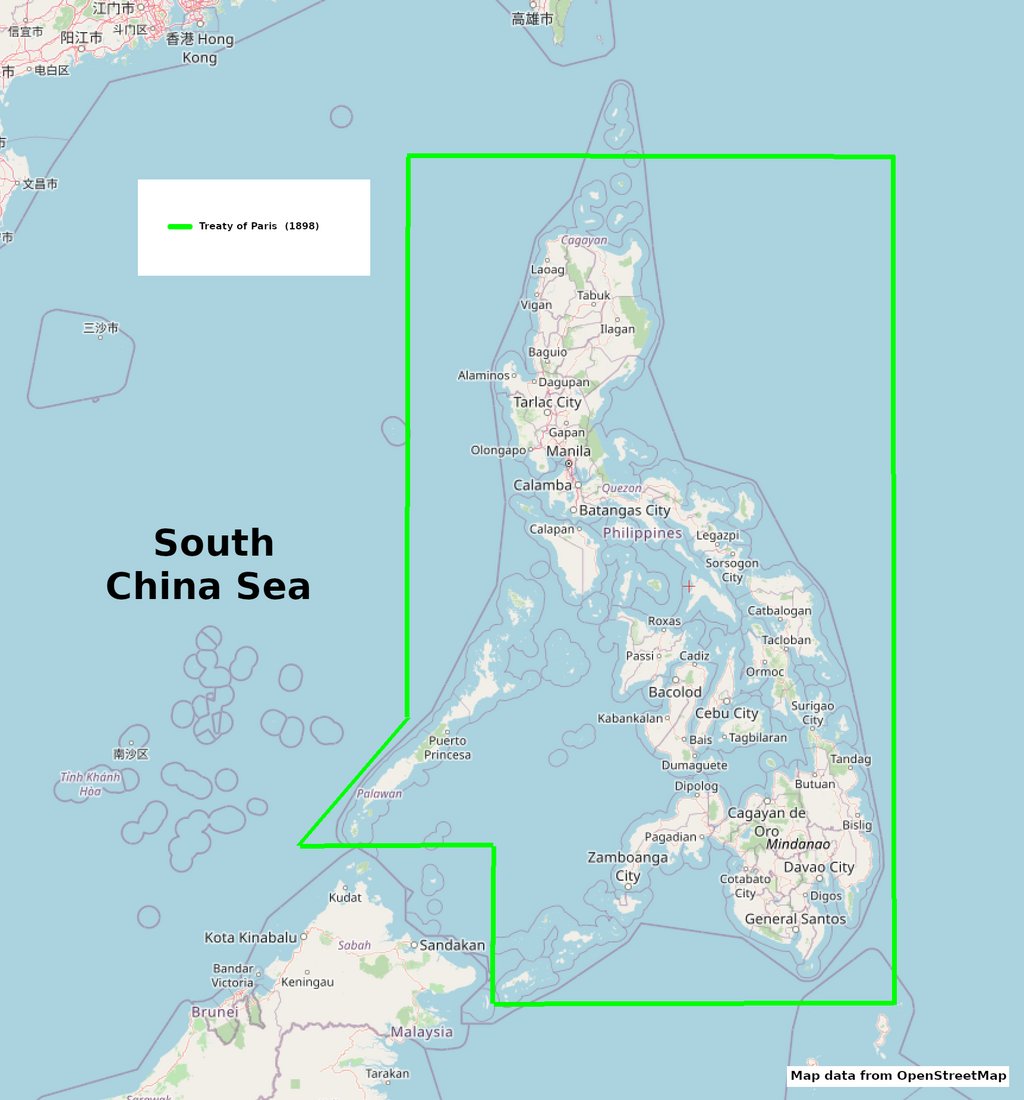This is hugely important and no-one is paying attention.
Philippines President Marcos Jr. just signed 2 new bills (the "Maritime Zones Act" and the "Philippine Archipelagic Sea Lanes Act"), backed by the U.S. State Department (via a press release by the infamous Matthew Miller: https://www.state.gov/on-the-philippines-maritime-zones-act/), that claim to implement "international law" but actually are a direct violation of international law in that they attempt to legitimize expansionist claims at the expense of virtually all its neighbors.
Let me explain
First, some context.
The Philippines exist as an independent country since 1946 when they gained their independence from the United States. They had never existed as a country before.
The establishment of the Philippines was officialized by the Treaty of Manilla.
Crucially, the Treaty of Manilla also defined Filipino territory as based on the earlier Treaty of Paris, when Spain ceded the Philippines to the US at the end of the Spanish-American War of 1898.
You can see these boundaries as defined in the treaty of Paris illustrated here

So since when have the Philippines started to claim these features as part of its territory?
It basically started in 1972 when the Philippines government invented a new municipality called "Kalayaan" (which means "freedom") that comprises a very large portion of the Spratlys.
This new expansionism wasn't welcome in the region given that China, Taiwan, Vietnam, Brunei and Malaysia all claim the Spratly islands either as a whole or in part...
Crucially, at the time, the US and the West in general did NOT recognize the legitimacy of the Philippines' claim over "Kalayaan", treating the Spratly islands as a disputed area (which it is).
For proof, see this fascinating memo from NSA Brent Scowcroft to President Ford, where the US explicitly states that "as disputed areas, the Spratlys and the Reed Bank can be defined as territory to which the [mutual defense] treaty would not apply."
https://xcancel.com/RnaudBertrand/status/1804052947690754255
Or see this recent 2020 "note verbale" to the UN by Britain, France and Germany in which they write they “take no position” over the “disputed territorial sovereignty to naturally formed land features [...] in the South China Sea” (https://www.un.org/Depts/los/clcs_new/submissions_files/mys_12_12_2019/2020_09_16_DEU_NV_UN_001.pdf)
Long context, sorry, but this is important, because these 2 new bills signed by Marcos Jr. completely change this status quo.
Let's look at what these new bills actually do, because it's quite clever - and extremely concerning.
The Maritime Zones Act (legacy.senate.gov.ph/lisdata…) does something unprecedented: it declares that "The high-tide features covered by the Kalayaan Island Group in the West Philippine Sea shall have a territorial sea of twelve (12) nautical miles."
This might sound technical, but it's actually a major legal maneuver, because under UNCLOS (the UN Convention on the Law of the Sea), only sovereign territory can generate territorial seas (https://www.un.org/depts/los/convention_agreements/texts/unclos/part2.htm)
So by declaring territorial seas around these features, the Philippines is essentially claiming sovereignty through the back door.
And here's where it gets really interesting: UNCLOS explicitly does NOT deal with sovereignty disputes.
The famous 2016 UNCLOS arbitration tribunal specifically states this (https://opencasebook.org/casebooks/479-introduction-to-international-comparative-law-fall-2016/resources/14.1-in-the-matter-of-the-south-china-sea-arbitration-philippines-v-china-excerpts/):
"This Tribunal has not been asked to, and does not purport to, make any ruling as to which State enjoys sovereignty over any land territory in the South China Sea, in particular with respect to the disputes concerning sovereignty over the Spratly Islands or Scarborough Shoal."
Did you see what the Philippines did there? Marcos said his new laws were made for the purpose of "aligning our domestic laws with international law, specifically UNCLOS" (pna.gov.ph/articles/1237378) and indeed the Maritime Zones Act references UNCLOS no less than 26 times!
BUT...
But it actually makes a very cynical mockery of UNCLOS, using it - a convention that explicitly doesn't deal with sovereignty - to actually claim sovereignty over disputed territories.
And it gets worse with the second bill, the Archipelagic Sea Lanes Act (https://legacy.senate.gov.ph/lisdata/4404440513!.pdf).
This act allows the Philippines to designate and control sea lanes through what it now claims as its "archipelagic waters" - which conveniently include these disputed areas.
Think about what this means: first you claim sovereignty through the Maritime Zones Act, then you regulate navigation through "your" waters with the Archipelagic Sea Lanes Act.
It's a two-step process to establish de facto control over disputed territories.
Let's look at the actual situation in the Spratlys today to understand why this is so problematic:
- Vietnam currently occupies 21 islets and reefs
- the Philippines itself occupies 10
- Malaysia has 7
- China also has 7
- The ROC holds the largest island in the archipelago
Instead of working through these complex overlapping claims via multilateral negotiations, these new bills try to bypass the whole process by simply declaring these disputed areas as Philippine territory through domestic law, then regulating access to them as if they were uncontested Philippine waters.
This was China's first reaction to the new bill (https://www.fmprc.gov.cn/mfa_eng/xw/wjbxw/202411/t20241108_11523786.html) stating that it "seriously violates UNCLOS and substantially impairs the integrity and authority of UNCLOS" (true) and "seriously violates the DOC", the Conduct of Parties in the South China Sea which is the multilateral negotiations between the SCS claimants that aims to find a solution to the disputes.
Frankly none of this would be a huge deal - just another unilateral move by crazy Marcos - if he didn't have U.S. official backing, a complete reversal from their historical position.
The same United States that, ironically, hasn't even ratified UNCLOS itself!
We've gone - as we saw earlier - from the U.S. explicitly stating these areas weren't covered by their mutual defense treaty with the Philippines, to now effectively endorsing expansionist claims that affect not just China, but also the ROC (Taiwan) and multiple ASEAN states.
In usual Matthew Miller Orwellian fashion, which we've seen on display wrt Gaza, he writes: "the US values Philippine leadership in upholding international law".
When as demonstrated earlier the acts are obviously an egregious and cynical violation of international law.
The question of course is whether it now means that the Spratlys - or "Kalayaan" - are now covered by the US-Philippines mutual defense treaty and whether this new set of legislation and the US's backing of it sets up the legal framework for this.
The US ambassador to China, Nicholas Burns, recently gave a first sign of the change in the US position, stating that "all the rest of the world understands that and recognises that this is sovereign Filipino territory" (https://x.com/RnaudBertrand/status/1773938209380307072) with reference to the Second Thomas Shoal and the Scarborough Shoal - a statement that is demonstrably false given that Britain, France and Germany's 2020 note verbale explicitly states they "take no position" on sovereignty claims in the area.
This fits into a broader and deeply concerning pattern we see in U.S. conduct generally - whether in Ukraine, Gaza, Taiwan, or now the South China Sea - where the U.S. systematically undermines diplomatic solutions in favor of escalation and confrontation.
In summary, we have the Philippines transforming relatively recent territorial claims into domestic law, not only bypassing international legal processes but actually misusing them.
They're cynically citing UNCLOS to do exactly what UNCLOS says it can't do: claim territory.
And more worryingly, the U.S. backing of these claims could set up a legal framework to extend defense commitments to disputed territories - creating the conditions for yet another potential military confrontation when it's the last thing the world needs right now...
The question of course is whether it now means that the Spratlys - or "Kalayaan" - are now covered by the US-Philippines mutual defense treaty and whether this new set of legislation and the US's backing of it sets up the legal framework for this.
The US has never met a pretext it didn't like. The only question is how far it intends to take things. Its "ideal" approach is probably a proxy war between China and The Philippines.
I guess they couldn't get Taiwan to destroy themselves for their western masters, so they've fished around in the region for a puppet regime that will.



